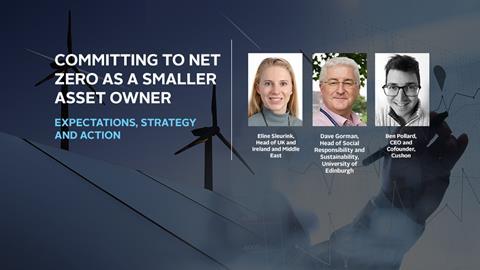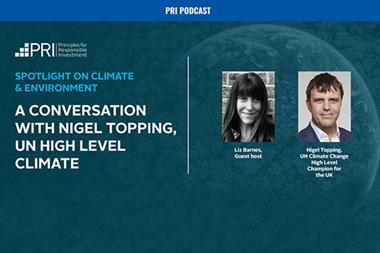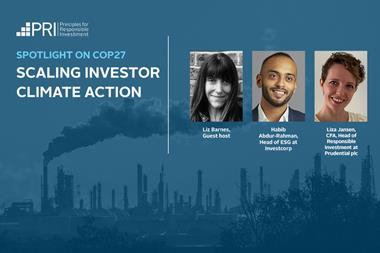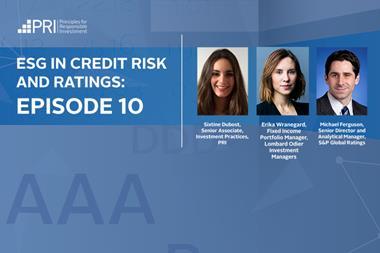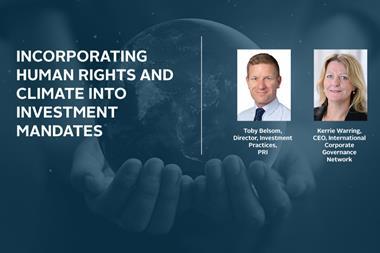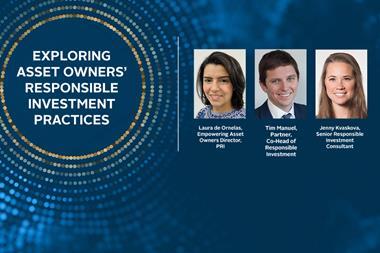During this episode, Eline Sleurink, Head of UK and Ireland and Middle East, Dave Gorman, Head of Social Responsibility and Sustainability, University of Edinburgh and Ben Pollard, CEO and Cofounder, Cushon discuss how the University of Edinburgh and Cushon have set a net zero target, the first steps they are taking to achieve this, how they built a business case for net zero internally, and how they are holding themselves accountable.
Committing to Net Zero as a smaller asset owner – expectations, strategy and action
With Eline Sleurink, Head of UK and Ireland and Middle East, Dave Gorman, Head of Social Responsibility and Sustainability, University of Edinburgh and Ben Pollard, CEO and co-founder, Cushon
Note: The Principles for Responsible Investment podcast is designed to be heard. If you are unable to do this, this transcript offers an insight into the episode.
Transcripts are generated using a combination of speech recognition software and human transcribers, and may contain the occasional error. Please check the corresponding audio before quoting in print.
Subscribe to the channel via Apple podcasts, Spotify, or wherever you listen to your podcasts.
Eline Sleurink
Hi and welcome to this PRI podcast. My name is Eline Sleurink and I’m the Head of the UK and Ireland and Middle East at the PRI. Today, I’m excited to be joined by Dave Gorman, Director of Social Responsibility and Sustainability at the University of Edinburgh, and Ben Pollard, Founder and CEO at Cushon.
During this episode will discuss how both the University of Edinburgh and Cushon have set a net zero target. The first steps they are taking to achieve this, how they built a business case for net zero internally and how they are holding themselves accountable. We’ll also touch on debates around greenwashing and the use of carbon offsets. And as today marks the first day of COPD 26 in Glasgow, the case for asset owners, whatever their size, to act on this couldn’t be clearer. It’s great to have Dave, and Ben join us today to share their perspectives and we hope this episode will encourage you to consider your own net zero strategies.
So let’s start with a quick fire round of introductions. Ben, if you could give us a brief overview of your organisation and your net so commitment, and then we’ll hand over to Dave.
Ben Pollard
Hi, thank you Eline. Delighted to be with you. So yeah Ben Pollard, Founder and CEO here at Cushman. Our net zero commitments is now. We are net zero at this point in time. We committed to being the first net zero pension provider in the world. So we’re very very proud of that and I’ll go into more detail as to how we’ve achieved that later on. And in terms of our organisation, we’ve got about 200,000 customers and 800 million of assets under management. We manage workplace savings on behalf of around 8,000 companies ranging from really big organisations like EY, Morgan Stanley, Siemens, Samsung, those sorts of people right down to the little five person hairdressers, based in Crawley. So that’s sort of overview of us. We’ve been a signatory of the PRI since February 2020. Yeah, delighted to be with you.
Eline Sleurink
Great, thanks so much Dave, go ahead.
Dave Gorman
Thank you, it’s a pleasure to be with you as well. And so I’m Dave Gorman. I’m Director of Social Responsibility and Sustainability at the University of Edinburgh. People may know University of Edinburgh as one of the world’s leading universities with quite a large organisation in their own right, with a turnover of about a billion and 42,000 students and 12,000 stuff.
And so my role is to advise us on what it means to be a responsible investor. We have an endowment fund which is the third largest in the UK after Oxford and Cambridge University, so about 500 million in that fund, and about 700 million of Treasury funds. And we don’t have any dedicated staff working on responsible investment, but we have probably 30 or 40 people across the organisation working on these sorts of issues and we try and tap into that.
We’re not an asset owner obviously. We have a net zero target for the University of 0 by 2040, and we’re currently discussing what does that mean for the investments that we’re making. We were delighted to sign up in 2013 and it was February 2013 to me. The first university in Europe to join the PRI - so very much look forward to the conversation.
Eline Sleurink Great thank you both it it’s fantastic to have you join us, so let’s move on to our first question. When you first started thinking about making a net zero commitment, how did you go about this and how did you get internal sign off and build a business case? Considering any costs involved as well? Dave, I’ll start with you first.
Dave Gorman
Thank you, so we’ve been on a journey for a while. As I mentioned, we designed the PRI in 2013 and everything we do on investments is part of a broader kind of theory of change for the Iniversity. So the University, people often think of universities is kind of degree factories. You know where we do research and meet and meet people degrees. We see ourselves at the University of Edinburgh is making a positive impact for society using all of our tools at our disposal. So our global reach we have 300,000 alumni. The fact that we have students from I don’t know 160 countries, that we do research teaching, but we also we buy products and we also invest. And so what we’ve been doing on investments is very much part of that.
It started with signing the PRI right and becoming a member into and learning from others who attended lots of PRI Conferences early on. We had also been caught up in the divestment debate. And so we divested from coal and tar sands in 2015 as a starting point. But by 2016 we had set this target of to be net zero for the whole university. And what we always said was that was a whole institution commitment. So we had to get there and be 0 for operations how we run our buildings. But we also had to get there for our investments and for our procurement and so on.
So in 20 early 2017 we then said, well, we’ll go the full hog will fully divest by the end of 2020, and that’s what we did. But we also looked at it from a broader lens, and so divestment is fine. But you know, you want to mainstream it. Divestment isn’t for everyone. So for us, what was driving us was partly our stakeholders. Obviously, we have a lot of young people studying with us. They’re very committed to seeing action on climate, and they were demanding action. We also took a risk view and said, well, we’ve clearly got assets at risk here. If we’re continuing to invest in fossil fuels, and so we did, a stranded assets assessment. We also thought there were opportunities, you know, if we’re going to or become false and free, then we should be investing in the solutions of the future and so that that was what was driving it for us. Combination of stakeholder pressure and expectation, element of risk of assets being at risk, some of the opportunities to invest for the long term in new opportunities and that broader context of trying to make a positive impact and influence others.
Eline Sleurink
Great, that’s clear. Thank you. Ben same question to you.
Ben Pollard
I mean, it wasn’t a very difficult business case for us to make to be completely honest that the climate crisis is the biggest crisis of the world at this point in time of a generation. You know, it’s hard to think of anything that’s more important really. And for us the decision really was whether we wanted to be a leader in that area or wanted to just sort of allow it to kind of happen to us as it was very clear that sort of direction of travel and the way that the wind was blowing, and the way that the tide is traveling. And I think really the question for all organisations is just where do you want to be positioned in that? Do you want to be sort of leading from the front or being sort a complicated decision for us. We also have the kind of I guess advantage really, if it’s we talk a lot about the virtuous circle and so.
One of the sort of traditional challenges for pension providers, has been engaging the members of your pension scheme with their pension and just getting them interested in it and excited about it and, you know, that’s a precursor to delivering better outcomes for people, and so being able to create a connection between your pension and the way that it’s invested and an issue that a huge number of people care very, very deeply about ie. climate change is actually an incredibly powerful commercial tool as well for us as a as a commercial business, and in driving greater engagement with people’s pensions and among our customer base. And you know, hardly anybody knows the average pension in the UK finances around 23 tons of CO2 each year which is equivalent to, for example, those gas cylinders that get used to power patio heaters. You could put a sort of social suicide to have a patio heater. Now, right? It’s the CO2 emissions are horrendous. You could take 960 of those and big propane cylinders, put them in your garden, lock the tops off, let them burn. That’s about 23 tons of CO2 that you’ve just emitted. That’s the equivalent to what the average UK pension finances every year and people don’t know that so.
Being able to kind of create this connection between financed emissions, your pension and an issue that you care really deeply about is a really powerful you know tool. And how fortunate are we to be in this situation where there’s this kind of alignment between doing the right thing you know, for its own purpose and actually the right commercial thing for us to do as a business as well.
Eline Sleurink
Great thank you! You know it’s fantastic to hear from both of you how that sort of internal business case involved in that you’ve now been able to action this. So actually thinking about your actions since then, what steps have you taken? So what were the concrete steps? Have there been any quick wins and challenges to date? And Ben why don’t you take this one first?
Ben Pollard
Sure. So, and as I, as I said at the beginning, we were very keen to take a leading role in this and act as a sort of stimulant for change and a kind of a sort of, you know, do something that made people stand up and think about this. One of the great sort of criticisms and challenges around climate is, is what can we do now? What action can we take now? The kind of the long term commitments of all you know clearly an important part of the picture, but what actually matters is the action right now. And so we were very keen if it was possible to get to a point where we were net zero now and we’re delighted to have been able to being able to do that and the big challenge, or well, there were many challenges, and one of them was just getting the data right, getting data on how much emissions your funds are financing is unbelievably difficult. It’s shameful really. How hard it is and that the fund management industry doesn’t make it easier to get access to this kind of data. And that was you know, one of our one of our big challenges - just getting a sort of baseline in the first place for what the financed emissions were at the moment, never mind what you can then do about them.
And we then, you know, worked very hard and continue to work very hard to drive as much emissions out of the portfolio as we could. You know there’s only so far you can. You can only go so far in terms of what you’re able to drive out of the portfolio now and then. The decision for us in order to get to a sort of net zero now position was whether or not we should offset the remaining emissions out of out of our own money, which is what we decided to do in the end. And again we can come on to some other sort of considerations about that, but I’d say those were the sort of three key challenges really just working out what you’re dealing with in the first place. Working out how to manage that down as fast as possible now given the set of solutions that are available in the market and then making this sort of difficult decision about what to do now about the rest of the emissions that you can’t drive out through the investment management solutions at the moment.
Eline Sleurink
Makes sense, thank you for sharing that and Dave. How’s your experience been?
Dave Gorman
Yeah, so I think I mentioned we started from the question of divestment and you know which was a difficult one for the University because it’s very polarizing. You know you’re talking about what you’re against. So we did complete divestment, the end of last year. But really we tried to move on quite quickly from that into more traditional territory, so I mentioned we did the climate risk assessment, which was very helpful and it helped us understand you know where the risks might be.
We decided early on that we would move about 15% of the portfolio into positive investments associated with renewables and sustainable technology. You know this idea that maybe we could be sort of in like Warren Buffett. Could we find things we want to hold for a long period because they’re going to grow over time. We’ve been spoiled that our investment committee is now. There’s opportunity in this space is not about loosing money, it’s about protecting and making money. We started then to measure our carbon footprint. And as Ben says, that was pretty challenging. But we started with carbon intensity. We’ve flipped recently to carbon footprint, but in both cases we were saying, let’s just get the numbers down. Let’s figure out what the numbers are, and let’s make them substantially lower than they were before and we started doing that. I think in a clever way. The investment committee didn’t rush to the best what it said to all the investment managers we have was, you know this is 2017 and by the end of 2020 we want to have fully divested and we want to reduce our carbon metrics. So, what you’re going to do about it?
And so we deliberately took our time, which wasn’t popular with everyone. But I think it had an impact because while it gave us a chance to have multiple conversations with investment managers, some of which are no longer with us because their answer wasn’t adequate and many of them came back initially with all this has been difficult. You know, I haven’t got the data, and you know, I might lose money and we sort of said, well, you know, give us a better answer to be honest. And then they came back saying “Actually, I’ve thought about it. Here is some data. It’s not perfect, but it’s good enough. And now that you’ve pointed out, as we’ve looked at it, actually there are lots of opportunities so there are no risks to your returns.”
And so that’s been quite positive for us, and we’re currently at the stage of figuring out how we will align. Unlike Ben were not in net zero yet, but we will be, you know, setting targets in in that space, but it’s very positive. I think our equity in carbon footprint is down 70% already and we know we just you know which? We’re just getting going on this in in terms of the challenges data. I would echo that particular scope 3, it’s difficult to know the quality of the data that we’re getting. I’ll probably add at the start as well as certain suspicion from people at the start of the process. If you go back, you know six or seven years – are you going to make my job as an investment committee more difficult? Am I going to make it lower return? Are you’re going to shrink the investment universe too much. For me, those were some of the challenges I think now the investment committee is very comfortable, so it thinks it. If anything, we’ve been prudent, we got rid of coal early on and that looks like a sensible decision to have made so we didn’t lose any money on coal. But you know, getting this sort of people who do this directly support it - that was a challenge.
And the final one was probably some of the other asset classes. So we made a lot of progress on equities and pool investments and property, but it’s been a bit more challenging for us in terms of high yield and we have multi-asset and multi-credit strategies as well and it’s a bit more challenging there to figure out how to measure the carbon and how to perform. But overall, I would say very positive we are making good strides and the challenges I think, just to finish the challenges, haven’t been as significant as the investment committee might have feared when it started on this journey. If anything, it’s reinforced and made their job more straightforward rather than less.
Eline Sleurink
No, that’s good to hear that. You know, once that sort of commitment is made that actually, it can reinforce the commitment through showing that you know this is possible. And as you both said, data remains a key challenge. I think we see that not only with net zero targets, but more broadly thinking about responsible investment. But I think it’s a case of not letting perfect be the enemy of good and taking those first steps. So if we think about next year, announcements more broadly, we’ve obviously seen a lot of those come up in the run up to COP 26, which is fantastic, but it also brings questions of accountability. So I was wondering how both cushon and the University of Edinburgh are holding themselves accountable. So are you setting any interim targets, and how are you measuring or thinking about your progress? So Dave, I’ll let you start first with this one.
Dave Gorman
Yeah, thanks. So we were in process is a minute so I don’t have a full answer yet. One of them is we announced full divestment at the turn of the year. In other words, you know, apart from, like you know, minuscule, some. There are no companies we invest in now, and coal and tar sands and oil and gas and the calculated reserves of oil and gas and coal associated with the portfolio is effectively 0.
And secondly, we promised to maintain their share of the endowment fund, which is in positive investments as I mentioned. And so we we’ve been reporting on that. And the minute with a Black Rock global opportunities fund. Then we will in due course be announcing how we’re going to align to the net zero target. So I would expect we’ll be announcing interim targets something like 2025, 2030, 2035, just so that there’s a clear pathway and the only debate is about the data. So, the reason we haven’t done it yet is, I don’t want to set the target and then find that there’s a bit of missing data, and I’ve made my, you know, my target a bit more difficult, but that’s just a detailed point.
And we have a fairly substantial reporting of our overall approach to sustainability and social responsibility. Anyway, so everything we’re doing here will be integrated into that. And then finally we will, I mentioned already we used to use the wacky measure. I think we’re going to move to carbon footprint. And so would start reporting the carbon footprint of the overall portfolio. I don’t know P arrival makers team so anyway, but we would be doing that in due course. It’s only a question of time for also I think by this at some point next year some of this will start to become public and then we can be judged against it.
Eline Sleurink
OK, great and Ben. What’s cushon doing in terms of holding itself accountable and maybe setting any interim targets?
Ben Pollard Yeah, great question. As I said, we’re very focused on what we can do now and the this sort of immediate impact that we can have. And in terms of accountability, our primary mechanism, and is the fact that any financed emissions that remain within our investment solutions, Cushon is paying for the offsets. For those out of its own money, so not out of the fund but out of Cushon’s corporates money. And that means that every day that we are not carrying on working harder to drive emissions out of the fund, it’s costing us money. And that’s a very sort - there’s other thinking behind it as well, but that’s a very conscious mechanism from this accountability perspective. To sort of indicate how seriously we’re taking this issue to illustrate that we’re serious about driving emissions out as quickly as possible and align our sort of corporate and financial incentives behind that message. Sort of putting our money where our mouth is kind of thing. And so that that sort of taken into account in and to supplement that we’ve set ourselves and the objective of eliminating our reliance on offsets i.e. driving their emissions within the fund to zero within the fund itself within the next five years - so by 2026. Now that’s a pretty punchy ambition and you know, honestly, can we say hand on heart that we will get there? Do we have an exact road map? No we don’t. But you know, can we say will sweat blood trying and it’s costing us money every day. We don’t, absolutely that’s the that’s the point, right?
And you know, again, we see part of our role in this as being a bit of sort of grit in the oyster. If you like and just kind of, you know making people think what’s what, what can be done? How can we make this happen faster, and what is it that’s stopping us from moving to those sorts of time scales and when we I think it’s part of our sort of start up mentality when we see sort of uncertainty and well then will air on the side of ambitious rather than airing on the side of well, we’re not sure if we say that, might you know we might fail and then? What is everybody going to think about us? We would rather be ambitious and open then then sort of airing on the side of caution and inaction.
Eline Sleurink
Makes sense and actually you mentioned carbon offsets obviously, and you know there has been some concern in the market around sort of this flurry of necessary commitments and potential greenwashing. And, you know, it’s also come up, maybe in particular around carbon offsets. So what are both of your views on these matters? So Ben, why don’t we start with you?
Ben Pollard
Yeah, so offsets can get a bad rep and the fundamental thing, avoidance is better than offsetting, right? That’s just matter of fact it’s better to avoid putting CO2 into the atmosphere in the first place then it is to put it in the atmosphere and then try and get it out again, right? That’s just self-evident and obvious, right? And so the problem with offsets is where they get used as an excuse to kind of carry on with business as usual, but it’s ok ’cause we’re offsetting we’re taking the emissions out the atmosphere again’. It’s like well, when wee put it as simply as that, it’s kind of obvious what the why that’s a problem, right? And however, the way that the if I go back to our sort of three big challenges, if you’ve genuinely done everything you can to avoid emissions in the first place and that has to be a genuine authentic drive. And then you’re left with the decision, should we? Or should we not offset the remainder.
Right, that’s the decision. And then when you look at what offsetting means. It means you know funding, putting financial resources into projects that are generally doing stuff that is kind of, you know, undeniably, a sensible and good thing to be trying to do so you know everything from wind, farms and hydroelectric, and that sort of thing, right through to preservation of rainforest, rewetting of peatlands. You know things that are, you know, very difficult to deny that they have good things to be encouraging to happen. The problem comes when you’re sort of using them as an excuse to carry on emitting stuff in the first place, right? But if you’ve if you’ve driven out as much as you can genuinely. Then to our mind, offsetting the remainder is well for us it was a no brainer that that was a sensible thing to do, and layering in the fact that it creates that direct financial incentive for cushion as a as a company and to continue driving hard to eliminate the emissions in the first place.
Eline Sleurink
Thanks and Dave moving onto you. So what’re your thoughts around the greenwashing accusations around net zero commitments?
Dave Gorman
Yeah, thanks. I agree a lot with what Ben has just said. You know, let’s start from the fact that the industry doesn’t have a brilliant reputation. You know, and so you can understand why people might have questions as to whether this is another aspect of what the industry is getting wrong and be candid about that. I’m not part of the industry. I can say that, you know, we’ve had several crisis suddenly down the years that don’t give people faith. Sometimes that what is being claimed is what’s actually being claimed. And I think there is a fine line between setting the ambition and the way Ben was talking about quite right. And then you’re just making things up that you have no plan about, or some point in the distance with some dubious ways of getting there so you know we’ve got to be honest. As Ben says we’ve got to transform. I mean, climate change. We can over complicate things. We need to end the use of fossil fuels as quickly as we can, and we need to manage land and forest much better so that they stop emitting carbon. Yeah, and that that. That is where you start from with this. So if you if you come up with offsets that aren’t going to deliver against those physical demands. Then quite rightly, this should be rejected. I would also agree that you start from that kind of demand and avoidance point, so we won’t be using offsets in our investments, but we are considering a form of offsets for our own operational emissions. And just as Ben was saying, we will be putting up new buildings that hopefully will be net zero. We will be spending hundreds of millions of pounds that decarbonise our heat supply, but when it comes to it, we’ll have what we think are unavoidable admissions for the next 30, 40, 50 years from aviation.
Now you could be saying to as well, just stop flying. Well, we have been doing that as part of COVID and we built in an approach to climate conscious trouble that will, as far as possible, make many of our meetings virtual. But we have researchers growing around the world now. You know, designing new ways of tackling, sleeping, sickness, and Africa. Do we think it’s worth flying there for them to do that? Yes, we do. We have people who actually, you know, troubles at the polar regions in order to study climate change will sometimes they need to fly. Yes they will. So I would agree with Ben that we’re going to have this kind of lump of unavoidable emissions, but that’s the only thing that we should be off silly. You know, we shouldn’t be starting from there, so for us when we are going to think about it. 2 key points - problem is, first one is. The principles of it should be additional. You have to be confident this additional. You’re not paying someone to do something that would have happened anyway. So it needs to be transparent, so I need to be able to understand what you’re talking about. I already can’t with some of the net zero claims that are being made. I don’t. I don’t know what they’re talking about. Frankly now and it needs to last for a while. One of the things we’ve learned from previous offsets as I come back ten years later, and there’s no evidence anything ever happened. So when if we do as a university additionality longevity, transparency will be key to what we do. Your 50 year commitments, not five year commitments. And the other thing I think I would add is that. There’s a danger of narrowing the focus to climate only. Climate is a major issue, but so is loss of nature, so is ocean degradation, so is loss of soil, so are some of the social issues associated with our supply chains. So I would be urging people who have thinking about offsets to tackle the tooling crisis of biodiversity loss and climate change together. Otherwise, you can end up doing carbon offsets that are bad for nature. Good for climate, bad for nature. So as far as possibly one achieve that kind of multiple win. So that’s our perspective.
Eline Sleurink
Yeah, there’s some from both of you very clear and compelling arguments there. Thank you, and actually this. Overall, it’s been a really engaging and interesting conversation. So thank you both. So to wrap up. I wanted to ask if a smaller asset owner is considering making a net zero commitment. What advice or tips would you give them so Dave or hand over to you first?
Dave Gorman
Firstly, make real commitments you know with the ambition that Ben was talking about that don’t delay. I would say, and also get your key people on board so have some frank conversations about it. But I would say get on with it cause it’s not going to be as hard as you think it’s going to be and the longer you sit paralysed by analysis then more will regret it as a society because we all need to take action now.
Eline Sleurink Great and then what are your sort of tips or words of inspiration?
Ben Pollard
Yeah, exactly the same. Hurry up get on with it. It’s a crisis crack on.
Eline Sleurink
Fantastic and then finally, as this is the first day of COPD 26, if you had to wish for one specific outcome from the next two weeks, what would that look like for you so Ben fire away?
Ben Pollard
And I think realistically, awareness of the impact of financed emissions and the direct connection between the way that people’s pensions money and savings are invested and the way that the world we live in works. It’s like like Dave, we’re saying fundamentally, you need to transition the way the world works. From reliance on fossil fuels and to rely on some sustainable fuels and. And that’s an economic thing about how we organise ourselves and what drives economics and step changes? Capital markets and that’s pensions at the end of the day. So in a sense, that connection is very, very short, but it’s and not sufficiently understood. You know, people think that the greatest impact they can have on climate change is sort of. You know, doing more recycling and switching to an electric car and that sort of thing. That’s great. Your pension is funding the equivalent of nine family cars each year.
Eline Sleurink
Yeah, that’s very clear, compelling, ask. Dave, what would your wish be?
Dave Gorman First of all, I’d agree with Ben. I’m also attempted to give one of those large answers which you know talks about the fact that I would love to see the poor of the world being listened to minority groups, gender, those kind of issues because it’s a justice issue as much as anything else. You know, people in the West like me are causing the problem. People in other parts of the world are receiving that problem. And it’s not fair, but to be more practical, I think I would love to see two things. One is the ending of the finance of coal right away and the ending of the use of cold by the end of this decade. We need to stop using coal. We need to get off coal. We need to people to stop financing coal as soon as possible. So I want to see the end of coal by the end of the decade. Whether that’s feasible or not. Secondly, gas. Gas, is not a long term option. I want to see people realising that we can’t just switch now from coal to gas and spend another 20 years. You got gas, at best a bridging fuel and so I want to see people thinking about that and not now moving money which was wasted on coal to be wasted on gas. So, there’s two practical things, no coal please in there as soon as possible and get off our addiction to gas as quickly as we possibly can as well.
Eline Sleurink
OK, and with that will bring this episode to a close. So thank you so much for joining us. Dave and Ben. If you’re interested in other work the PRI has produced around COP 26 and climate more generally. Visit our website which is unpri.org and look out for a podcast which we will publish in a few weeks to hear the PR ICO Fiona Reynolds reflect on the outcomes of COP 26.
Thank you for listening and we hope you found this episode inspiring.


